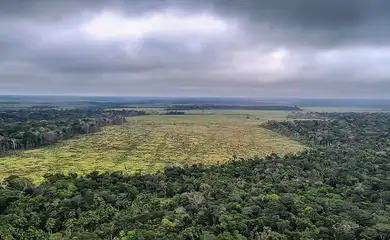G20: Brazil aims to make $11 billion of green funds available

The Brazilian presidency of the G20 discussed in Brasília a proposal to reduce bureaucracy and facilitate access to resources that have stalled in the four main global funds that finance projects to combat climate change.

Ambassador Tatiana Rosito, Secretary for International Affairs at the Ministry of Finance, and the Coordinator of the Finance Track in the current G20 administration, stated that Brazil's initiative had received broad support from the bloc's members.
At a press conference summarizing the meetings, Ambassador Rosito noted the enthusiastic reception of the Brazilian proposal by G20 members. “The proposal aims to broaden access, reduce bureaucracy, and increase the capacity to mobilize both public and private resources for the four main multilateral climate funds or green climate funds," she said.
Rosito identified the four funds as the Green Climate Fund (GCF), the Global Environment Facility (GEF), the Adaptation Fund (AF), and the Climate Investment Funds (CIFs).
According to the ambassador, these funds have accumulated a total of $11 billion. In economic terms, financial leakage occurs when available resources are not spent or invested for their intended purposes due to bureaucratic issues or other problems. Essentially, it refers to funding that fails to reach its intended recipients, particularly projects in poor and developing countries.
"These are important funds because they are concessional [non-refundable]. We're talking about donations and loans that can leverage a much larger volume of resources. What we are proposing is that, over the course of this year, there should be an independent review of these funds. This required a lot of coordination with the members and with the funds themselves. There is a consensus that the processes are very bureaucratic and time-consuming, especially in view of the emergency we are experiencing, of mobilizing figures that exceed $3 or $4 trillion [over the next few decades]," she remarked.
Tatiana Rosito recalled, for example, that during the last United Nations Climate Change Conference, COP28, in Dubai, United Arab Emirates, a statement endorsed by the four funds backed the Brazilian initiative to review the current criteria for resource allocation, aiming to streamline access by reducing bureaucracy.
"The G20 is an appropriate forum for us to make these changes, precisely because most of the donors to these funds are part of the group," said the ambassador.
Taking stock
Last week's meetings marked the beginning of the preparatory activities leading up to the G20 summit in November 2024, where heads of state and government will convene in Rio de Janeiro. Prior to this summit, over 120 events are scheduled throughout the year, taking place in various host cities both within the country and abroad.
The G20 consists of 19 countries and two regional bodies: the African Union and the European Union. Together, the G20 members account for approximately 85 percent of the world's Gross Domestic Product (GDP), over 75 percent of global trade, and around two-thirds of the world's population.
This marks Brazil's inaugural tenure as the temporary president of the group for a one-year term. Upon assuming the presidency of the G20 on December 1, the government emphasized three key discussion priorities: combating hunger, addressing climate issues, and enhancing global governance.




